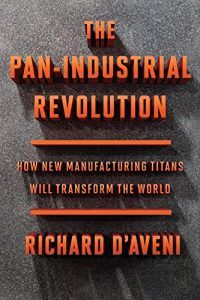
Richard D’Aveni was recently inducted into the Thinkers50 Hall of Fame. Here, we take a closer look at his work.
“D’Aveni is the Kissinger of corporate strategy,” Adrian Slywotzky, author of The Profit Zone, has observed. “There are few authors with the prescience that D’Aveni has had. Each of his books accurately predicted major shifts in the nature of competition and the economy,” says Gary Hamel. Fortune likened D’Aveni to the ancient master of strategic arts, Sun Tzu, as he advises executives either to be revolutionaries, and or to create order out of the chaos that revolutionaries cause. He also advises government, militaries, and other organizations on how to compete effectively.
 His most recent focus is on how 3D printing will change strategies, firms, markets, and even geopolitics. His book, The Pan-Industrial Revolution: How New Manufacturing Titans Will Transform the World (2018), explains the strategic implications of recent advances in additive manufacturing.
His most recent focus is on how 3D printing will change strategies, firms, markets, and even geopolitics. His book, The Pan-Industrial Revolution: How New Manufacturing Titans Will Transform the World (2018), explains the strategic implications of recent advances in additive manufacturing.
Richard A. D’Aveni is the Bakala Professor of Strategy at Dartmouth’s Tuck School of Business. He holds a Ph.D. from Columbia University and a bachelor’s degree from Cornell University, as well as a law degree and MBA.
He is a previous recipient of the Thinkers50 Strategy Award and has been a fixture on the Thinkers50 ranking of the world’s leading management thinkers since its inception in 2001. D’Aveni’s research looks for the winning competitive strategies used by corporations, governments, militaries, and sports teams in conflict. He seeks the fundamental principles of the application of power that transcends time, space, type of rival, and arena of competition.
His first book, Hypercompetition (1994), predicted the evaporation of long term competitive advantages based on barriers to entry and power over buyers, suppliers, and substitutes. It foresaw the demise of national oligopolies, broken up by challengers with temporary advantages in the dynamic economy of the late 1990s and beyond. Next, Strategic Supremacy (2001) predicted that global companies would aim to replace national oligopolies with new global spheres of influence. These spheres of influence would create new forms of barriers to entry. Beating the Commodity Trap (2010) described how spheres of influence in turn would be undermined by commoditization in local markets, and offered a variety of tactical responses.
Strategic Capitalism (2012) looked at the many types of capitalism emerging around the world, especially in China, and foresaw conflicts between some incompatible models. It predicted an economic cold war, including over trade, between the U.S. and China.
T50 Ranking
T50 Award
Shortlisted

Thinkers50 Limited
The Studio
Highfield Lane
Wargrave RG10 8PZ
United Kingdom

Thinkers50 Limited
The Studio
Highfield Lane
Wargrave RG10 8PZ
United Kingdom

Thinkers50 Limited
The Studio
Highfield Lane
Wargrave RG10 8PZ
United Kingdom
| Cookie | Duration | Description |
|---|---|---|
| LANG | 9 hours | Linkedin set this cookie to set user's preferred language. |
| nsid | session | This cookie is set by the provider PayPal to enable the PayPal payment service in the website. |
| sp_landing | 1 day | The sp_landing is set by Spotify to implement audio content from Spotify on the website and also registers information on user interaction related to the audio content. |
| sp_t | 1 year | The sp_t cookie is set by Spotify to implement audio content from Spotify on the website and also registers information on user interaction related to the audio content. |
| tsrce | 3 days | PayPal sets this cookie to enable the PayPal payment service in the website. |
| x-pp-s | session | PayPal sets this cookie to process payments on the site. |
| __cf_bm | 30 minutes | This cookie, set by Cloudflare, is used to support Cloudflare Bot Management. |
| Cookie | Duration | Description |
|---|---|---|
| l7_az | 30 minutes | This cookie is necessary for the PayPal login-function on the website. |
| Cookie | Duration | Description |
|---|---|---|
| CONSENT | 2 years | YouTube sets this cookie via embedded youtube-videos and registers anonymous statistical data. |
| _ga | 2 years | The _ga cookie, installed by Google Analytics, calculates visitor, session and campaign data and also keeps track of site usage for the site's analytics report. The cookie stores information anonymously and assigns a randomly generated number to recognize unique visitors. |
| _gat_gtag_UA_10408481_1 | 1 minute | Set by Google to distinguish users. |
| _ga_ZP8HQ8RZXS | 2 years | This cookie is installed by Google Analytics. |
| _gid | 1 day | Installed by Google Analytics, _gid cookie stores information on how visitors use a website, while also creating an analytics report of the website's performance. Some of the data that are collected include the number of visitors, their source, and the pages they visit anonymously. |
| Cookie | Duration | Description |
|---|---|---|
| NID | 6 months | NID cookie, set by Google, is used for advertising purposes; to limit the number of times the user sees an ad, to mute unwanted ads, and to measure the effectiveness of ads. |
| test_cookie | 15 minutes | The test_cookie is set by doubleclick.net and is used to determine if the user's browser supports cookies. |
| VISITOR_INFO1_LIVE | 5 months 27 days | A cookie set by YouTube to measure bandwidth that determines whether the user gets the new or old player interface. |
| YSC | session | YSC cookie is set by Youtube and is used to track the views of embedded videos on Youtube pages. |
| yt-remote-connected-devices | never | YouTube sets this cookie to store the video preferences of the user using embedded YouTube video. |
| yt-remote-device-id | never | YouTube sets this cookie to store the video preferences of the user using embedded YouTube video. |
| yt.innertube::nextId | never | This cookie, set by YouTube, registers a unique ID to store data on what videos from YouTube the user has seen. |
| yt.innertube::requests | never | This cookie, set by YouTube, registers a unique ID to store data on what videos from YouTube the user has seen. |
| Cookie | Duration | Description |
|---|---|---|
| DEVICE_INFO | 5 months 27 days | No description |
| loglevel | never | No description available. |
| m | 2 years | No description available. |
Thinkers50 Limited has updated its Privacy Policy on 28 March 2024 with several amendments and additions to the previous version, to fully incorporate to the text information required by current applicable date protection regulation. Processing of the personal data of Thinkers50’s customers, potential customers and other stakeholders has not been changed essentially, but the texts have been clarified and amended to give more detailed information of the processing activities.